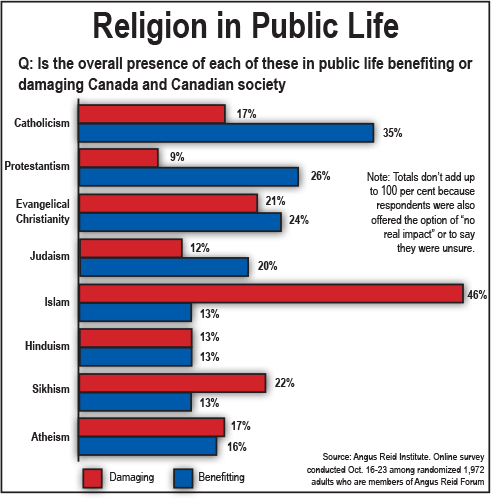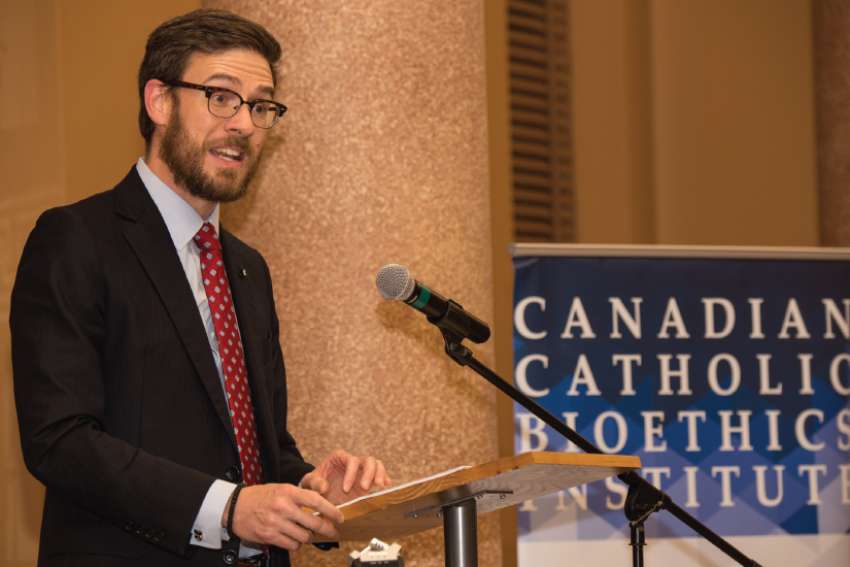But despite those positive findings, religious freedom expert Andrew Bennett is worried about Canada’s acceptance of religion and religious diversity.
“My fear is that increasingly the public square is becoming this gated community, where the only people who can inhabit it are those who adhere to this new type of secular orthodoxy,” Bennett told The Catholic Register.
In a public lecture sponsored by the Canadian Catholic Bioethics Institute, Bennett made the case that religion in general and Christianity in particular are being shoved aside in the media, the courts and legislatures. Bennett argues religious freedom is under attack and Canadians no longer understand or respect the contributions religion has made to Canada’s social fabric.
“We may not have red martyrdom in this country, but we will experience white martyrdom — shaming and disavowal,” Bennett told an audience of about 40 at the annual CCBI lecture at St. Michael’s College on Nov. 16.
 The Angus Reid poll on Canadian attitudes toward religion surveyed 1,972 Canadian adults between Oct. 16 and 23. It found that only 14 per cent think religious contributions to public life are a bad thing and more than twice as many, 38 per cent, see religion’s contribution as good. A big mushy middle of 48 per cent opt for a “mix of good and bad.”
The Angus Reid poll on Canadian attitudes toward religion surveyed 1,972 Canadian adults between Oct. 16 and 23. It found that only 14 per cent think religious contributions to public life are a bad thing and more than twice as many, 38 per cent, see religion’s contribution as good. A big mushy middle of 48 per cent opt for a “mix of good and bad.”Additionally, roughly half the population believes religion remains as relevant or more relevant as ever, and a majority support maintaining tax exempt status for churches.
The poll was commissioned by the Christian think tank Cardus for its Faith in Canada 150 project. Bennett is the law program director at Cardus and the former Canadian ambassador for religious freedom.
“You have to ask yourself when people are answering this question (about positive or negative contributions of religion), what are they imagining? What are they thinking about when they say religion?” said St. Jerome’s University sociologist of religion David Seljak. “I think they’re thinking about hospitals, health services, social services, education. And they’re thinking about the fact that religion provides people with meaning, direction, a moral compass.”
This positive assessment of religion has nothing to do with the specific moral positions of churches on end-of-life care, abortion, sexuality — most of them unpopular or misunderstood by the general population, Seljak said.
“People are less interested in what the Church teaches and what theologians say,” he said. “But they are appreciative of what the churches are doing.”
Bennett acknowledges that most Canadians are positive about individual people of faith and religiously-inspired institutions, from hospitals to universities. “My concern is at the elite level,” he said.
Court rulings, new legislation and a disdainful tone in the media have conspired to marginalize traditional religious views on marriage, homosexuality, transsexuals, abortion, suicide and the permissibility of voluntary euthanasia, he said.
“Government is taking action proscribing a certain morality,” said Bennett. “Both proscribing — saying that if you hold a particular moral view that is not longer tolerant — and also prescribing a particular morality through laws on a whole range of issues.”
But if Bennett feels besieged it’s not because Canadians are against him, said Seljak.
“I have heard some people say that Christianity is persecuted,” Seljak said. “That is again an inference that conservative Christians are picking up from the United States. Canadian Christians sometimes feel that — the dynamics of that culture war that is occurring between conservatives and liberals in the United States, between Christians and secularists as some groups imagine. I think this poll shows that simply isn’t happening.”
What has changed is that under the constitutional order of the last 35 years, courts and legislatures in Canada no longer favour Christians.
“The government is refusing to legislate Christian morality and the Supreme Court has adamantly said it will basically strike down any legislation that attempts to legislate morality for individuals,” Seljak said.
While Canadians tell pollsters they’re in favour of religious freedom and view religion positively on a general level, they are decidedly negative on Islam. Almost half (46 per cent) told Angus Reid they view the overall presence of Islam in public life as “damaging” to Canada and Canadian society. Only 13 per cent were willing to say the tiny minority of less than four per cent of Canadians are “benefitting” Canada.
On the specific issue of Muslim women who wear veils in public, 87 per cent of Quebeckers and 70 per cent of Canadians outside Quebec said they favour legislation limiting these Muslim women’s access to public services and their employment in the public sector.
Both Bennett and Seljak bemoan ignorant, xenophobic attitudes toward Muslims prevalent throughout Canada.
“The root cause of people’s opposition is ignorance — ignorance of what Islam is about,” Bennett said.
People can’t demand religious freedom for themselves and turn around and deny that same freedom to a tiny minority of new Canadians, he said.
“We have an opportunity to champion the human dignity and the religious freedom of all religious communities, including Muslims,” said Bennett. “I would be a pretty funny Catholic if I was opposed to what a woman wears on her head, given religious (nuns’) habits.”
“Generally, people don’t have complaints about their Muslim neighbours. But this mistrust occurs mostly at the level of imagination,” said Seljak. “We’re dealing at the mythological level.”
In contrast, Catholics are the most positively viewed religious subset of Canadians. Twice as many Canadians say Catholicism is “benefitting” Canadian society (35 per cent) as those who say it is “damaging” society (17 per cent). More than half of those surveyed said they understand Catholicism either “quite well” or “very well.” At the same time, 47 per cent said Catholic influence in public life is shrinking, with only five per cent saying it’s on the rise.
Most Canadians understand the seal of the confessional, with 72 per cent saying priests should not be forced to disclose what they hear in confession.
The big divide on religion in Canada’s public life is between the believers and the unbelievers. While 71 per cent of religiously committed Canadians say that religious and faith communities are making a “very good” or “more good than bad” contribution to the country, only 13 per cent of non-believers say the same thing.
A clear majority of 54 per cent of non-believers say the government shows “too much” or “way too much” respect for religion. Only 12 per cent of religiously committed Canadians say the same.
In the population as a whole, 34 per cent say the government over-does respect for religion. One in six say the government shows too little respect for religion and nearly half (49 per cent) think the government gets the balance about right.
The 19 per cent of Canadians who are non-believers also disagree with their fellow citizens about the tax-exempt status of religious foundations. Almost eight in 10 non-believers want their local churches, synagogues, mosques and temples taxed. But the majority of survey respondents (55 per cent) supports tax-exempt status for organized religion.


